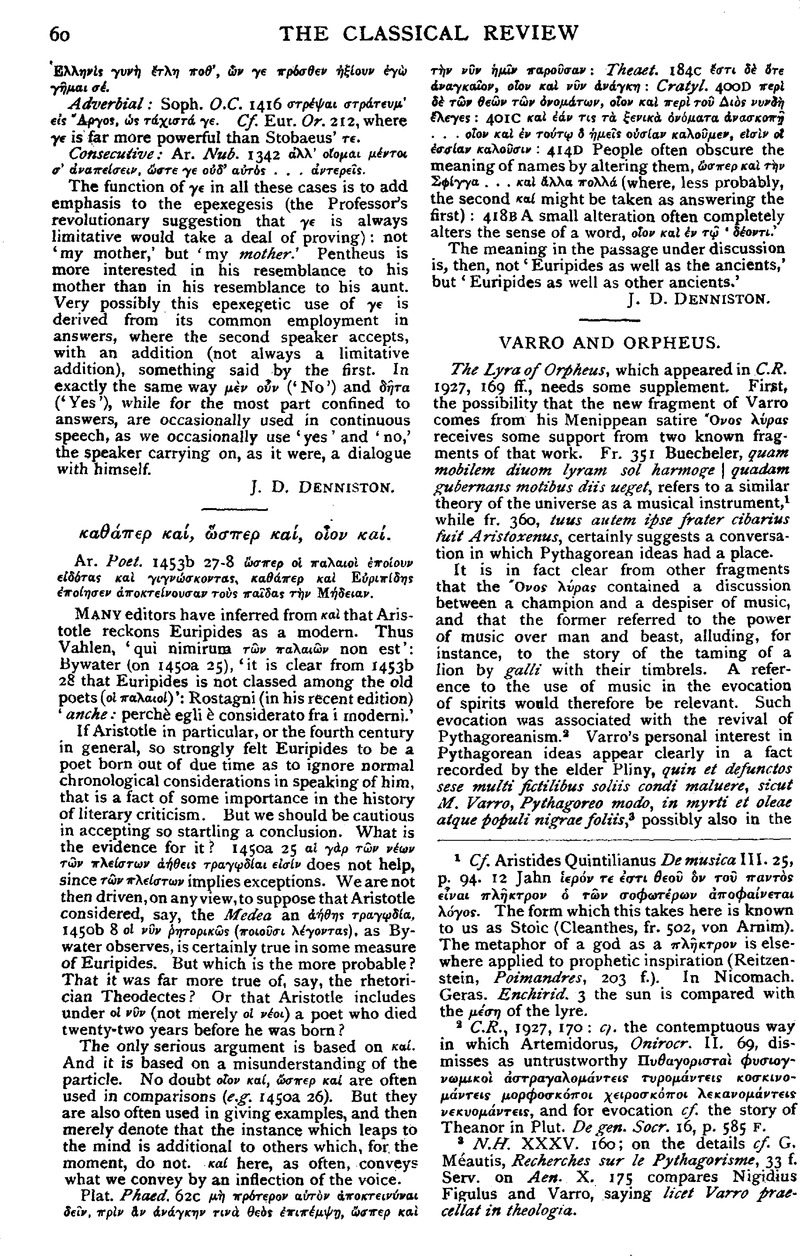Article contents
Abstract

- Type
- Review Article
- Information
- Copyright
- Copyright © The Classical Association 1929
References
page 60 note 1 Cf. Aristides Quintilianus De musica III. 25, p. 94. 12 Jahn ἰερ⋯ν τε ⋯στι θο⋯ς παν τ⋯ς εἶναι πλ⋯κτρον ⋯ τ⋯ν σοφωτ⋯ρων ⋯ποφαἰνεται λ ⋯γος. The form which this takes here is known to us as Stoic (Cleanthes, fr. 502, von Arnim). The metaphor of a god as a πλ⋯κτρον is elsewhere applied to prophetic inspiration (Reitzenstein, Poimandres, 203 f.). In Nicomach. Geras. Enchirid. 3 the sun is compared with the μ⋯ση of the lyre.
page 60 note 2 C.R., 1927, 170: cf. the contemptuous way in which Artemidorus, Onirocr. II. 69, dismisses as untrustworthy ![]() , and for evocation cf. the story of Theanor in Plut. De gen. Socr. 16, p. 585 F.
, and for evocation cf. the story of Theanor in Plut. De gen. Socr. 16, p. 585 F.
page 60 note 3 N.H. XXXV. 160; on the details cf. Méautis, G., Recherches sur le Pythagorisme, 33 f.Google Scholar Serv. on Aen X. 175 compares Nigidius Figulus and Varro, saying licet Varro praecellat in theologia.
page 61 note 1 Weinreich, O., Triskaidekadische Studien, 91 ff.Google Scholar Varro in his Tubero stated a Pythagorean view of embryology (Censorin. De die natali, 9). It may be remarked that in De re rustica III. 17. 4 he tells a story of the power of music over fishes; and Martianus Capella IX. 929 credits him with telling of islands that move to music.
page 61 note 2 Aelian, , Nat. anim. X. 28.Google Scholar
page 61 note 3 Ap. Diog. Laert. VIII. 31; cf. Delatte, A., La vie de Pythagore 226 f.Google Scholar The alternative is to supply θε⋯ν, ‘to the highest god,’ a term commonly but not exclusively applied to Jehovah; it may be that Alexander's interest in Judaism explains his use of it, if he did use it here. (He employs it in an etymology, F.H.G. III. 212.)
page 61 note 4 Vita Pythagorae 18 § 82, 6 § 30.
page 61 note 5 Cumont, , Etudes Syriennes, 61 f.Google Scholar, 102, 106: for the moon as an intermediate stage [Augustine] Quaest. uet. et noui test. 127. 18, p. 407. 2 Souter. The variant in Dracontius, Romulea X. 538 Sol Persice Mithra … accipe Sol radians animas, tu corpora Luna, nutrimenta animae is perhaps a wrong inference by D. as to pagan belief based on the idea that the body came at birth from the moon, for which cf. Cumont, Théologie solaire in Mém. Acad. Inscr. XII. 463.
page 61 note 6 Eunapius, , Vita Aedesii, p. 37Google Scholar in Boissonade's 1822 edition.
page 61 note 7 Macrob. In Somn. Scip. II. 3. 6. Cicero, Somn. Scip. 5, had said quod docti homines neruis imitati atque cantibus aperuerunt sibi reditum in hunc locum, sicut alii qui praestantibus ingeniis in uita humana diuina studia coluetunt, which connects the idea with the Hellenistic notion of an immortality limited to great souls and benefactors of humanity.
page 61 note 8 De musica II. 19, p. 67 Jahn.
- 1
- Cited by


